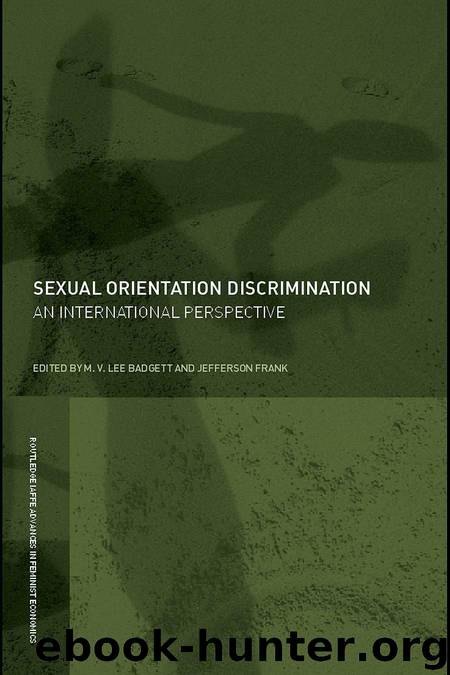Sexual Orientation Discrimination: An International Perspective by Lee Badgett & Jeff Frank

Author:Lee Badgett & Jeff Frank
Language: eng
Format: mobi
Tags: non.fiction
ISBN: 9780415770231
Publisher: Routledge
Published: 2007-05-07T00:00:00+00:00
Entire sample Gay men
Lesbians
Bisexuals
Statement (N=565)
(N=389)
(N=131)
(N=45)
(a) All sexualities are created
464
319
109
36
by God and should be fully accepted
(82.1%)
(82.0%)
(83.2%)
(80.0%)
(b) Sexual intercourse should always
23
27
4
2
be potentially procreative
(5.8%)
(6.9%)
(3.1%)
(4.4%)
(c) Christian sexual ethics should be
524
364
125
43
concerned much more with responsible
(92.7%)
(93.6%)
(95.4%)
(95.5%)
behaviour and justice to individuals,
rather than the acceptability of
particular kinds of genital acts
(d) Same-sex genital acts are always
25
20
3
2
incompatible with Christian principles
(4.4%)
(5.1%)
(2.3%)
(4.4%)
(e) The traditional biblical exegesis on
480
327
114
39
homosexuality is inaccurate
(84.9%)
(84.1%)
(87.0%)
(86.7%)
(f) Heterosexual marriage is the ideal
92
78
8
6
of all Christian intimate sexual
(16.3%)
(20.1%)
(6.1%)
(13.3%)
relationships
(g) Heterosexual sex outside marriage
88
68
13
7
is incompatible with Christian faith
(15.6%)
(17.2%)
(9.9%)
(15.6%)
(h) The Churches are highly
505
348
118
39
uncomfortable in dealing with sex
(89.4%)
(89.5%)
(90.1%)
(86.7%)
and sexuality
(i) The Churches have not taken due
527
364
120
43
account of the experiences of gay,
(93.3%)
(93.6%)
(91.6%)
(95.5%)
lesbian and bisexual Christians in their
examination of the issues of human
sexuality
(j) The Churches have encouraged
539
374
130
35
heterosexism in society
(95.4%)
(96.1%)
(99.2%)
(77.7%)
(k) The Churches have contributed to
530
368
129
33
the perpetuation of homophobia in
(93.8%)
(94.6%)
(98.5%)
(73.3%)
society
(l) The Churches should recognize
521
352
126
43
same-sex relationships
(92.2%)
(90.5%)
(96.2%)
(95.6%)
218 Andrew K.T. Yip
issue. Such members, as I have argued, are less likely to be recruited for research purposes.
Like other discriminated members of society, LGB Christians have been establishing support networks since the 1970s. In the case of LGB Muslims, such efforts are currently embryonic. Signifi cantly, the internet has also contributed to the establishment of ‘virtual’ support networks, which are particularly important to those who have little physical access to support networks due to geographical location and fear of exposure. In the case of LGB Christians, the establishment of the Gay Christian Movement in 1976 – renamed the Lesbian and Gay Christian Movement in 19877 – has had a signifi cant impact on the confi dence and social visibility of this community. As mentioned, development in this respect is comparatively recent for LGB Muslims. Al-Fatiha UK, the very fi rst support organization of its kind, was established only in 1999.8 This was followed by S afra Project in 2001.9
Support groups/organizations such as the above perform two primary functions. First, they – in principle at least – provide a safe platform for identity reinforcement and community building, where the participants could explore the integration of their sexuality and religious faith. This is particularly important to those who are in the beginning stage of their journey of sexuality, as Shazia, a lesbian Muslim in her 20s, testifi es.
It really is just nice to go somewhere where you could use the words ‘gay’ and
‘Muslim’ in a sentence, without someone jumping down on your throat and saying ‘Oh, that’s wrong’ or ‘You’re not a real Muslim’. And it is nice to know that other people have lived it [the struggle] … Their presence validates me.
Assurance and confi dence gained from actual and virtual contact with support groups and organizations have an important positive impact on the psychological health and social integration of participants such as Shazia. Another signifi cant function of support groups and organizations is to mobilize members for social actions to challenge discrimination. Unlike the previous function, which is defensive, this is an offensive strategy to rattle religious orthodoxy and challenge homophobia within religious communities. Within the LGB Christian community, such efforts have been burgeoning for the past three decades, typifi ed by a highly political agenda of the Lesbian and Gay Christian Movement, which at times attracts much media interest.
Download
This site does not store any files on its server. We only index and link to content provided by other sites. Please contact the content providers to delete copyright contents if any and email us, we'll remove relevant links or contents immediately.
International Integration of the Brazilian Economy by Elias C. Grivoyannis(111064)
The Radium Girls by Kate Moore(12033)
Turbulence by E. J. Noyes(8056)
Nudge - Improving Decisions about Health, Wealth, and Happiness by Thaler Sunstein(7711)
The Black Swan by Nassim Nicholas Taleb(7136)
Rich Dad Poor Dad by Robert T. Kiyosaki(6642)
Pioneering Portfolio Management by David F. Swensen(6303)
Man-made Catastrophes and Risk Information Concealment by Dmitry Chernov & Didier Sornette(6022)
Zero to One by Peter Thiel(5805)
Secrecy World by Jake Bernstein(4755)
Millionaire: The Philanderer, Gambler, and Duelist Who Invented Modern Finance by Janet Gleeson(4481)
The Age of Surveillance Capitalism by Shoshana Zuboff(4303)
Skin in the Game by Nassim Nicholas Taleb(4255)
The Money Culture by Michael Lewis(4211)
Bullshit Jobs by David Graeber(4195)
Skin in the Game: Hidden Asymmetries in Daily Life by Nassim Nicholas Taleb(4010)
The Dhandho Investor by Mohnish Pabrai(3772)
The Wisdom of Finance by Mihir Desai(3751)
Blockchain Basics by Daniel Drescher(3585)
